The Building with Biology project is an effort to engage diverse public audiences in multi-directional conversations with members of the synthetic biology community. Synthetic biologists have been involved from the very beginning of the project, and have participated in a number important ways. Some members of the synthetic biology community helped us to conceive of the project, helped us to think about the questions to discuss with the public, and provided valuable feedback to inform the educational efforts of the larger Building with Biology team. The particular scientists listed below worked with educators from 12 science centers and other project team members during the project's first year to co-create and revise a suite of pilot activities that created conversations with public audiences at eight science centers around the nation (visit the Year 1 Pilot Events & Activities page to learn more). Hundreds of other scientists volunteered at local Building with Biology events, which took place nationwide during the summer of 2016, to participate in a broader national conversation about the field of synthetic biology, its potential applications, and their societal and ethical implications.
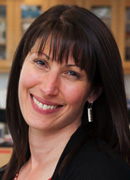
Natalie Kuldell, PhD
President, The BioBuilder Educational Foundation and Instructor, MIT Department of Biological Engineering
Natalie says: "I am excited to participate in the Building With Biology project because it will provide more avenues for interested people to enter into this community of practice."
Engineering can devise many ways to solve a problem, while science can discover how things in the living world work. BioBuilder explores how to most efficiently and reliably apply our scientific understanding to engineered solutions.
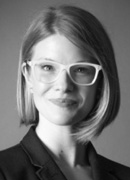
Megan J. Palmer, PhD
William J. Perry Fellow in International Security at the Center for International Security and Cooperation (CISAC) at Stanford University & Deputy Director of Policy & Practices for the Synthetic Biology Engineering Research Center (Synberc)
Dr. Palmer is a biological engineer whose work seeks to develop and advise on best practices and policies for responsibly advancing biotechnology. She leads many programs designed to explore the broader impacts of biotechnology, including the Synthetic Biology Leadership Excellence Accelerator Program (LEAP) and through the International Genetically Engineered Machine (iGEM) competition. The Building with Biology project excites her because it brings in new and diverse communities into conversation around future directions for biotechnology as the field is actively developing. Dr. Palmer hopes that participants in the Building with Biology activities and forums will help answer how building with biology changes our relationships with living systems – and ourselves.
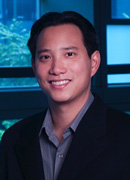
Brian Y. Chow, PhD
Assistant Professor, Department of Bioengineering, University of Pennsylvania
Dr. Chow’s laboratory at University of Pennsylvania invents new technologies to manipulate and monitor cellular physiology in intact biological circuits. Prior to Penn, he was at Third Rock Ventures, a life sciences venture capital firm, and served on the founding management team of SAGE Therapeutics, a company developing medicines for rare nervous system disorders. He has also held engineering roles at IBM. Dr. Chow received his B.S. in Chemistry from Stanford University and his Ph.D. from the MIT Media Laboratory, where he also conducted his postdoctoral training, jointly with the Department of Biological Engineering and McGovern Institute for Brain Sciences.
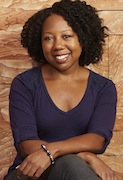
Karmella Haynes, PhD
Assistant Professor, Fulton School of Biological and Health Systems Engineering, Arizona State University
Dr. Haynes is an assistant professor at Arizona State University’s Fulton School of Biological and Health Systems Engineering. She earned her B.S. in Biology at Florida A&M University (1999) and her Ph.D. in Molecular Genetics at Washington University, St. Louis (2006). She launched her career in synthetic biology through Postdoctoral fellowships at Davidson College (2008) and Harvard Medical School (2011). Her work with a team at Davidson College on bacterial computers was featured on NPR's Science Friday and was recognized as "Publication of the Year" in 2008 by the Journal of Biological Engineering. Dr. Haynes is an Affiliated PI and advisory board member for the Engineering Biology Research Consortium (EBRC), serves as Judge Emeritus for the International Genetically Engineered Machines Competition (iGEM), and is a co-founder of the Cold Spring Harbor Summer Course in Synthetic Biology. She is a recipient of the NIH NCI Research Scientist Development Award to Promote Diversity (K01). Her research aims to regulate therapeutic genes in cancer cells by engineering the proteins that package human chromosomes.
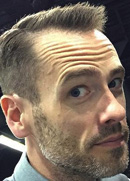
Terry D. Johnson, PhD
Associate Teaching Professor, Bioengineering, University of California-Berkeley
Terry asks: "What is something that concerns or excites you about synthetic biology, but you suspect that scientists might not be thinking about?"
Dr. Johnson is primarily interested in engineering education and has contributed to work in tissue engineering and synthetic biology, demonstrating a versatility that has prevented him from gaining any actual expertise.
Dr. Johnson is excited about participating in the Building with Biology project, because “who doesn’t love museums?”
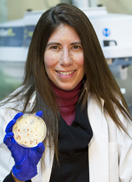
Ellen Jorgensen, PhD
Co-founder and director of Genspace
Ellen asks: “Has the general public even heard about synthetic biology before?
Genspace, is a nonprofit community laboratory dedicated to promoting citizen science and access to biotechnology. In 2011 she initiated Genspace’s award-winning curriculum of informal science education for adults, and in 2014 Genspace was named one of the World's Top 10 Innovative Companies in Education by Fast Company magazine. Dr. Jorgensen’s efforts to develop Genspace into a haven for entrepreneurship, innovation and citizen science have been chronicled by Nature Medicine, Science, Discover Magazine, Wired, Make, BBC News, The Economist, Forbes, PBS News Hour, The Discovery Channel, and The New York Times. Dr. Jorgensen has a Ph.D. in Molecular Biology from New York University, spent 30 years in the biotech industry, and is currently adjunct faculty at New York Medical College, the School of Visual Arts, and Cooper Union. Dr. Jorgensen’s talk ‘Biohacking- you can do it, too’ at TEDGlobal 2012 has received over a million views.
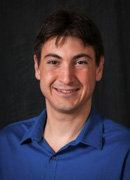
Firas Khatib, PhD
Assistant Professor, Department of Computer and Information Science, University of Massachusetts Dartmouth
Firas says: "I have witnessed firsthand how engaging the public can help us solve difficult scientific problems, which is why this synthetic biology public engagement project is so appealing to me. I am also interested to hear the public's thoughts on intellectual property rights with respect to synthetic biology, as there are many potential hurdles with the ownership of these new technologies."
Dr. Khatib’s research group harnesses the collective brainpower of humans worldwide to tackle critical problems in computational biology with the protein folding video game Foldit.
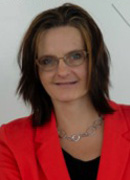
Jennifer Kuzma, PhD
Goodnight-NCGSK Foundation Distinguished Professor in the School of Public and International Affairs and Co-Director of the Genetic Engineering and Society Center at North Carolina State University.
Jennifer asks: “Biotechnology advances have the ability to change societies—do people trust experts and elected officials to make decisions for them, or would they like a larger role in that process?”
Dr. Kuzma has worked in the area of emerging technologies and governance for over 20 years and authored over 90 scholarly publications in policy sciences, social sciences, and natural sciences. She has worked in science and technology practice in Washington DC as a program and study director at the National Academy of Sciences, and AAAS Fellow at the USDA. Her recent work focuses on systems for appropriate and responsible innovation and oversight of emerging applications of biotechnology, including gene editing, gene drives, and synthetic biology.
Dr. Kuzma is very excited about the Building with Biology project as it seeks to engage publics in conversations about synthetic biology and she believes that it is vital that the public(s) are aware of advances in biotechnology and have a voice in policy choices and debates. She is curious to understand the role that the public would like to have in making choices about whether products of synthetic biology should be deployed in the environment, consumer products, agriculture, and health care.
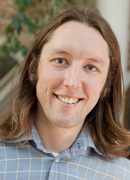
Julius B. Lucks, PhD
Assistant Professor of Chemical and Biomolecular Engineering at Cornell University.
Dr. Lucks’ research combines both experiment and theory to ask fundamental questions about the design principles that govern how RNAs fold and function in living organisms, and how these principles can be used to engineer biomolecular systems. As a Miller Fellow, he pioneered the development of the first RNA-based synthetic genetic circuits, and was the leader of the team that created SHAPE-Seq – a technology that uses next generation sequencing to characterize RNA structures in unprecedented throughput, and that is now being used to uncover the role of RNA structure in regulating fundamental cellular processes across the genome. His lab focuses on dynamically programming cellular behavior with synthetic RNA circuitry, and using/developing SHAPE-Seq to understand RNA folding dynamics in the cell. For his pioneering research efforts, he has been named a DARPA Young Faculty Awardee, an Alfred P. Sloan Foundation Research Fellow, an ONR Young Investigator, an NIH New Innovator, and has been named an NSF CAREER awardee.
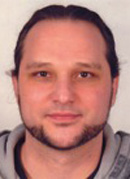
Daniel Malouli, PhD
Staff Scientist, Vaccine & Gene Therapy Institute, Oregon Health and Science University
Daniel says: "Given the strong influence of synthetic biology on our work, we are more than happy to share our work with the public to try to introduce the general audience the this promising concept of vaccine development, and to get feedback on how we can explain and communicate or work better to avoid misunderstandings and miscommunications and to take away the fear of bioengineered organisms in modern life and modern medicine."
In Dr. Malouli’s lab, the team is involved in the development of new vaccines against infectious diseases that kill hundreds of thousands of people every year. Their vaccine platform is based on the custom genetic engineering of herpes virus vaccine vectors. These constructs are used as carriers to deliver the vaccine to the desired location in the human body and to create a strong immune response against the targeted pathogen.
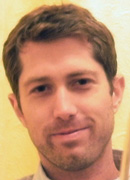
Jeff Tabor, PhD
Assistant Professor of Bioengineering & Assistant Professor, Biochemistry and Cell Biology, Rice University
Jeff says “I am excited to hear what areas of their lives the public thinks synthetic biology could benefit the most.”
Dr. Tabor’s lab programs bacteria to sense and respond to chemical and physical stimuli, with applications in basic science, industry and medicine.
Dr. Tabor feels that it’s very important to reach out to the public and explain what scientists do in the research lab, because it helps them to be better researchers, and helps the public understand where the science is going.

